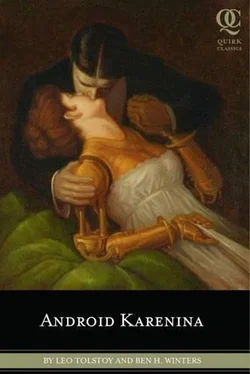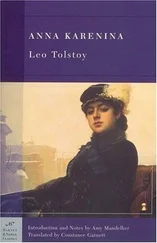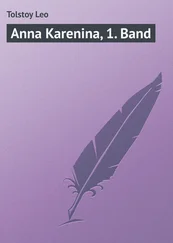“I did not cause this attack!” shouted Federov, staggering to his feet. “But I can still the hope that provokes it!” Levin, moaning, clutching at himself with his badly scalded hands, sat up and stared-as Federov pulled out a dagger and drove it into his own heart.
Levin gasped; the man from UnConSciya screamed and doubled forward, pushing the knife in to the hilt. No further bombs were heard, only the eerie crackling of the burning forest.
“Remember these words, men,” Federov said between clenched teeth, sinking to his knees. “Rearguard… Action.”
“Rearguard…,” intoned Levin, as if hypnotized.
“Action,” Vronsky mumbled.
VRONSKY HAD AGREED to pursue the tête-à-tête at the Huntshed partly because he was attracted, as all cocksure men are, by a chance for further adventures-just as the tippler, once he has tasted wine, will again and again reactivate the II/Barrel/4. But also Vronsky was bored in the country and wanted to show Anna his right to independence. He had not in the least expected that the tête-à-tête would so interest him, so keenly excite him, and that he would be so good at this kind of thing.
After burying the body of the UnConSciya man in a circular hollow a hundred or so paces from the Huntshed, Levin and he stopped to discuss the remarkable events, and to enjoy smoking cigars. They spoke in a calm and happy way-though, while they seemed to be perfect allies and friends, their past rivalry forgotten, Levin did not mention that his Class III still lived, buried in a Urgensky smoke factory; and Vronsky did not bring up his cherished hope, that if only he could get Anna to “see it right,” they would give up their share in rebellion entirely.
They were thus smoking and talking, when Lupo was beamed a communiqué and promptly lit it up on his monitor.
It was from Anna, and before Vronsky watched it, he already knew its contents. Expecting the tête-à-tête to be over in five days, he had promised to be back on Friday. Today was Saturday, and he knew that the communiqué contained reproaches for not being back at the fixed time.
The missive was not unexpected, but the form of it was unexpected, and particularly disagreeable to him. Anna’s face flashed red in the projection, as she bitterly pronounced, “Annie is very ill, and Placebo”-a Vozdvizhenskoe decom who had once been beloved-companion to a great Moscow doctor-“says it may be inflammation. I am losing my head all alone. I expected you the day before yesterday, and yesterday, and now I am sending to find out where you are and what you are doing. I wanted to come myself, but thought better of it, knowing you would dislike it. Send some answer, that I may know what to do.”
Vronsky played the communiqué again, to ensure he had it right, and again watched the pleading face of Anna Karenina. Send some answer, that I may know what to do. The child ill, yet she had thought of coming herself. Their daughter ill, and this hostile tone. The adrenalin-flushed excitement of the meeting in the woods and this gloomy, burdensome love to which he had to return struck Vronsky by their contrast. But he had to go, and immediately he bid Levin farewell and set off home.
BEFORE VRONSKY’S DEPARTURE for the tête-à-tête, Anna had reflected that the scenes constantly repeated between them each time he left their fortifications might only make him cold to her instead of attaching him to her, and resolved to do all she could to control herself so as to bear the parting with composure. But the cold, severe glance with which he had looked at her when he came to tell her he was departing for the meeting had wounded her, and before he had started, her peace of mind was already destroyed.
In solitude afterward, thinking over that glance which had expressed his right to freedom, she came, as she always did, to the same point-the sense of her own humiliation. “He has the right to go away when and where he chooses,” she complained to Android Karenina. “Not simply to go away, but to leave me. He has every right, and I have none. But knowing that, he ought not to do it.” Together they had fled Petersburg, together they had built Vozdvizhenskoe on the old abandoned patch of farmland. But now while he was out playing the role of dashing rebel leader, she waited for him alone in the autumn cold.
“What has he done, though?… He looked at me with a cold, severe expression. Of course that is something indefinable, impalpable, but it has never been so before, and that glance means a great deal,” she concluded, as Android Karenina softly stroked her flowing hair. “That glance shows the beginning of indifference.”
And though she felt sure that a coldness was beginning, there was nothing she could do, she could not in any way alter her relations to him. Just as before, only by love and by charm could she keep him. And so, just as before, only by occupation in the day, by Galena Box at night, could she stifle the fearful thought of what would be if he ceased to love her. There was still one means, she finally admitted to herself, not to keep him-for she wanted nothing more than his love-but to be nearer to him, to be in such a position that he would not leave her.
That meant a divorce from Karenin; worse, it meant dispatching an emissary to the Higher Branches, revealing their location; it meant giving up their arms, begging forgiveness of the Ministry. And, of course, it would mean giving up their Class III robots, though this possibility Anna was not ready even to consider.
Absorbed in such thoughts, she passed five days without him, the five days that he was to be at the mysterious tête-à-tête in the woods. When the sixth day ended without his return, she felt that now she was utterly incapable of stifling the thought of him and of what he was doing there, just when her little girl was taken ill. Anna began to look after her, but even that did not distract her mind, especially as the illness was not serious. However hard she tried, she could not love this little child, and to feign love was beyond her powers. Toward the evening of that day, still alone, Anna was in such a panic about him that she decided to start for the town, but on second thought recorded the contradictory communiqué that Vronsky received, and without watching it through, beamed it off to Lupo. The next morning she received his reply and regretted her communiqué. She dreaded a repetition of the severe look he had flung at her at parting, especially when he knew that the baby was not dangerously ill.
But still she was glad she had sent the communiqué. At this moment Anna was positively admitting to herself that she was a burden to him, that he would relinquish his freedom regretfully to return to her, and in spite of that she was glad he was coming. Let him weary of her, but he would be here with her, so that she would see him, would know of every action he took.
She was sitting in the drawing room, and as she read she listened to the sound of the wind outside, every minute expecting the carriage to arrive. The farm was silent, with the cold and complete silence of an estate populated only by robots, who in their nightly Surcease made not even the smallest sound. Only one companion robot at Vozdvizhenskoe still had its human, and that was Android Karenina; now she brought tea, warmed on her own groznium core.
At last Anna heard the unmistakable whomp of Frou-Frou Deux’s big paws kicking up dirt in the covered entry. Android Karenina looked up, her eyebank flickered; Anna, flushing hotly, got up; but instead of going down, as she had done twice before, she stood still. She suddenly felt ashamed of her duplicity, but even more she dreaded how he might meet her. All feeling of wounded pride had passed now; she was only afraid of the expression of his displeasure.
Читать дальше












